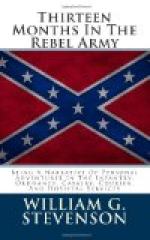Morgan, as a citizen in times of peace, maintained the reputation of a generous, genial, jolly, horse-loving, and horse-racing Kentuckian. He went into the Rebellion con amore, and pursues it with high enjoyment. He is about thirty-five years of age, six feet in hight, well made for strength and agility, and is perfectly master of himself; has a light complexion, sandy hair, and generally wears a mustache, and a little beard on his chin. His eyes are keen, bluish gray in color, and when at rest, have a sleepy look, but he sees every one and every thing around him, although apparently unobservant. He is an admirable horseman, and a good shot. As a leader of a battalion of cavalry, he has no superior in the Rebel ranks. His command of his men is supreme. While they admire his generosity and manliness, sharing with them all the hardships of the field, they fear his more than Napoleonic severity for any departure from enjoined duty. His men narrate of him this—that upon one occasion, when engaging in a battle, he directed one of his troopers to perform a hazardous mission in the face of the enemy. The man did not move. Morgan asked, in short quick words,
“Do you understand my orders?”
“Yes, captain, but I can not obey.”
“Then, good-by,” said Morgan, and in a moment the cavalryman fell dead from his saddle. Turning to his men, he added, “Such be the fate of every man disobeying orders in the face of an enemy.”
No man ever hesitated after that to obey any command.
But Morgan is not without generosity to a foe. A Federal cavalryman related to me, since my escape, an unusual act for an enemy. Losing the command of his wounded horse, which goaded by pain plunged wildly on, he was borne into the midst of Morgan’s force. “Don’t shoot him!” cried Morgan to a dozen of his men who raised their pistols. “Give him a chance for his life.” The pistols were lowered and the man sent back to his own lines unharmed. Few men have appeared on either side in this contest who combine dash and caution, intrepidity and calmness, boldness of plan with self-possession in execution, as does Morgan. The feat reported of him in Nashville, shortly after the Rebel army retreated through it, illustrates this. Coming into the city full of Federal soldiers in the garb of a farmer with a load of meal, he generously gives it to the commissary department, saying, in an undertone, that there are some Union men out where he lives, but they have to be careful to dodge the Rebel cavalry, and he wishes to show his love for the cause by this little donation. Going to the St. Cloud to dine, he sits at the same table with General McCook, since cruelly murdered, and is pointed out to the Federal officer as the Union man who had made the generous gift. He is persuaded to take the value of it in gold, and then, in a private interview, tells the Federal officer that a band of Morgan’s cavalry is camping near him, and if one or two hundred




